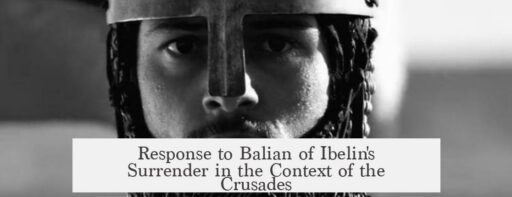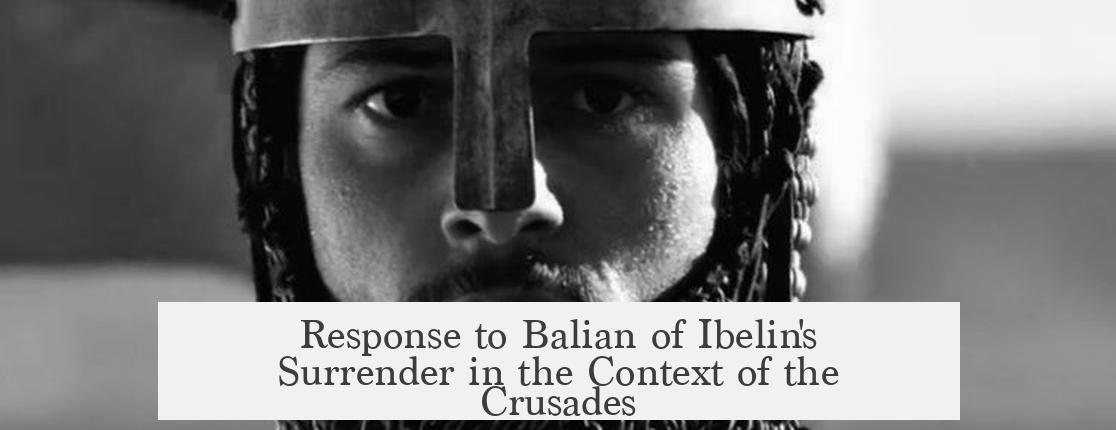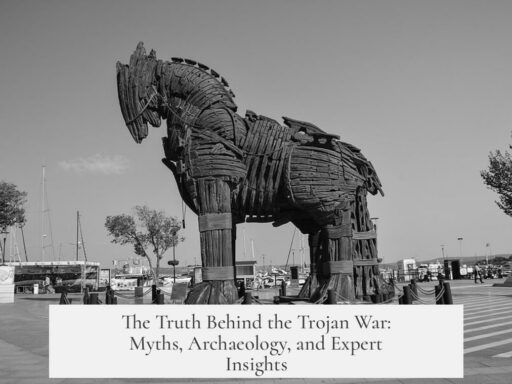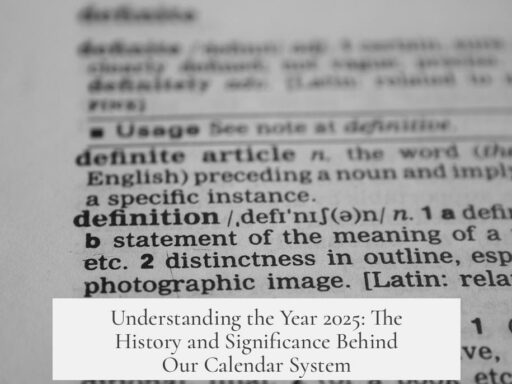The response to Balian of Ibelin’s surrendering Jerusalem in 1187 was complex and polarized, shaped by military realities, political factionalism, and religious considerations. Some chroniclers saw Balian as a hero who protected the city and its people, while others labeled him a traitor who handed the kingdom to Saladin without sufficient resistance.
Balian emerged as the highest-ranking noble after the disastrous defeat at the Battle of Hattin. The crusader army was shattered, and Jerusalem faced inevitable siege. Recognizing the grim situation, Balian assumed command of the city’s defense.
Despite having sworn an oath to Saladin never to take up arms against him, Balian was released from this vow by Patriarch Eraclius on religious grounds. The patriarch argued that the defense of Christendom took precedence over the oaths made to a non-Christian ruler. This absolution gave Balian moral and legal legitimacy in the eyes of the city’s Christian inhabitants to lead its defense.
The city was poorly defended, with fewer than a dozen knights alongside Balian to resist Saladin’s forces. Nevertheless, the defenders prepared diligently by stockpiling food and money to withstand the siege, rallying the population for the harsh times ahead.
Saladin began the siege of Jerusalem on September 20, 1187, after defeating crusader forces throughout the kingdom. The city, isolated and vulnerable, faced a siege it could not ultimately repel. Balian negotiated the terms of surrender with Saladin, striving to avoid the massacre and destruction that had accompanied the crusaders’ capture of Jerusalem in 1099.
Saladin, recognizing Balian’s honorable conduct and leadership, responded with leniency. He granted safe passage for the Christian inhabitants who could afford to pay ransom, ensuring many could reach other crusader strongholds like Tripoli and Tyre. Balian himself requested permission to escort his wife and children safely out of Jerusalem, which Saladin granted without ill-will. This mutual respect underscored the negotiations and demonstrated a pragmatic approach by both leaders.
Internally, the response to Balian’s surrender varied sharply. Latin Christian chroniclers native to Jerusalem tended to praise Balian as a courageous and pragmatic defender who placed the welfare of the city above futile resistance. Prominent historians like William of Tyre provided a generally positive depiction of Balian and the Ibelin family, emphasizing duty and sacrifice.
Conversely, political rivalries influenced perceptions. The Ibelin faction, led by Balian’s relatives, had distanced itself from King Guy of Lusignan’s contested rule. Many viewed Guy as an ineffective leader and saw the fall of Jerusalem as tied to his mismanagement. Against this backdrop, some voices branded Balian a traitor for surrendering rather than fighting to the death or resisting longer. This accusation reflected broader dissatisfaction with the kingdom’s leadership rather than solely Balian’s actions.
The fallout from the surrender triggered larger geopolitical consequences. The loss of Jerusalem provoked the launch of the Third Crusade, attracting figures such as Richard I of England and Philip II of France. Meanwhile, Guy of Lusignan’s legitimacy suffered further damage when Saladin released him after captivity, but he found himself unwelcome among the crusaders due to his diminished standing and Sibylla’s death during the siege.
| Aspect | Response to Balian’s Surrender |
|---|---|
| Military Context | Balian led a largely undefended city facing siege after battle losses. |
| Religious Justification | Patriarch Eraclius absolved Balian’s oath to Saladin to prioritize Christian defense. |
| Political Factions | Ibelin faction supported Balian; Guy of Lusignan’s reign was contested. |
| Saladin’s Reaction | Lenient, negotiated terms, allowed safe passage for inhabitants and Balian’s family. |
| Historical Views | Dichotomy: heroic defender vs. faithless traitor among chroniclers. |
| Long-term Impact | Fall of Jerusalem led to the Third Crusade and reshaped crusader leadership. |
In sum, Balian’s surrender is viewed as a pragmatic and honorable act under dire circumstances by those sympathetic to the crusader cause in Jerusalem. The religious absolution allowed him to act without breaking Christian norms. Saladin’s generosity toward the city’s inhabitants and Balian’s family shows mutual respect between the opposing leaders. Political opposition and faction rivalry, however, complicated the narrative and contributed to some branding Balian as a traitor.
- Balian’s surrender was largely driven by military necessity and a desire to protect civilians.
- Religious authority absolved Balian’s oath to Saladin, legitimizing his defense of Jerusalem.
- Saladin’s response was lenient and respectful, granting safe passage after negotiated surrender.
- Chronicler opinions split between heroic savior and traitor, influenced by political factions.
- The fall of Jerusalem triggered the Third Crusade and changed the political landscape.
What was Saladin’s response to Balian of Ibelin surrendering Jerusalem?
Saladin showed leniency toward Balian. He allowed Balian safe passage to arrange his family’s safety. Despite Balian breaking an oath to not fight him, Saladin did not treat him harshly.
How did the religious leaders in Jerusalem react to Balian defending the city?
Patriarch Eraclius absolved Balian of his oath to Saladin. He argued that defending Christendom was more important than the oath to a non-Christian ruler. This gave Balian religious legitimacy to lead the defense.
What role did political factionalism play in the response to Balian’s surrender?
Political divisions influenced views on Balian. Supporters of Guy of Lusignan often saw Balian as a traitor, while the Ibelin faction regarded him as a hero. These rivalries shaped the conflicting opinions about his actions.
How did the inhabitants of Jerusalem respond to Balian’s leadership before the surrender?
The city’s inhabitants begged Balian to stay and defend Jerusalem. Although he had few knights, the people supported him. They accepted his leadership during the difficult siege.
Was Balian’s surrender seen as betrayal or pragmatism by contemporaries?
Opinions were divided. Some chroniclers praised Balian for protecting civilians and choosing a bloodless surrender. Others viewed him as betraying the kingdom by handing it over to Saladin.




